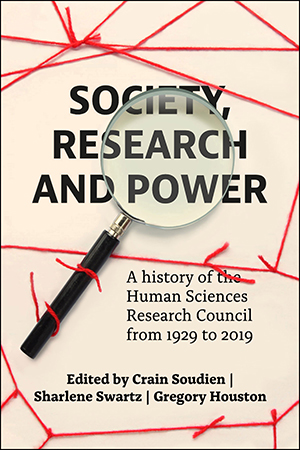
- 2021/540 pages
- Distributed for HSRC Press
Includes color photographs.
Society, Research and Power:
A History of the Human Sciences Research Council from 1929 to 2019
Paperback: $45.00
ISBN: 978-0-7969-2605-0
This scholarly reflection on state-based research commemorates the 90th anniversary of the National Bureau for Education and Social Research—South Africa's first public social research organization—and the 50th anniversary of its successor, the Human Sciences Research Council (HSRC). The contributors delve into the rich archives of the HSRC in all its iterations and, notably, examine its relationship with the dominant political structures of successive eras. They also addresss the topical issue of the role of evidence and scientific knowledge in policymaking.





